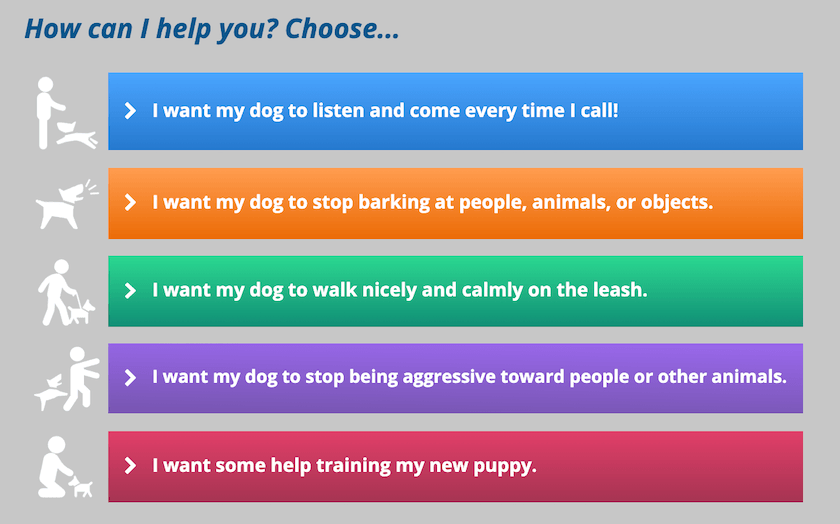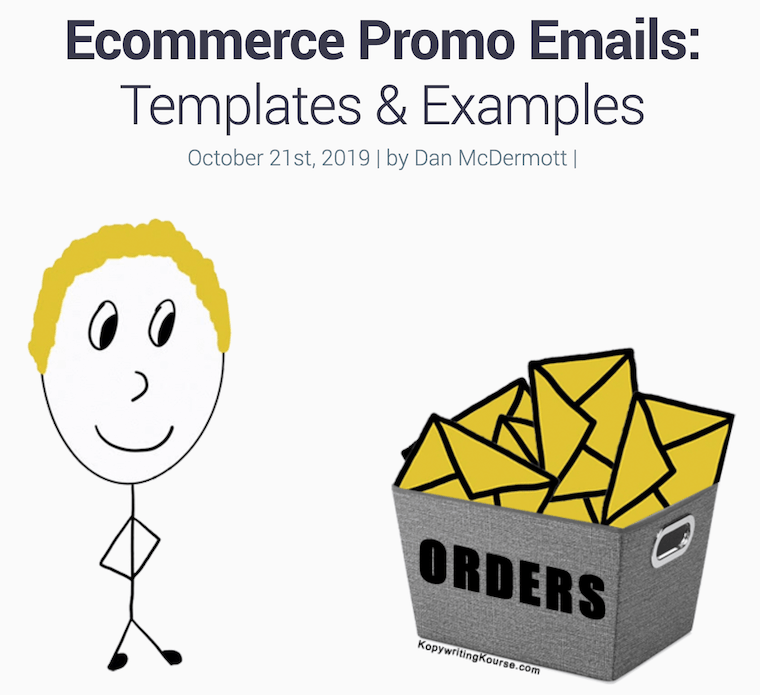
FREE VIDEO SERIES
How to Launch an Online Business From Scratch >>
How to Launch an Online Business From Scratch >>
The Beginners Guide to Starting an Online Business
Chapter 2:
The Best Business Model to Start With

If you followed along in Chapter 1, then you’re in an excellent starting position to start your online business.
That's because you've already:
- Become acutely familiar with a niche and their problems
- Developed a customer avatar to represent that niche
- Picked out the most painful problem that needs solving
And in this chapter, we get to crunch numbers, talk about money and decide on the actual business you’re going to start.
Until you begin selling a product or service, or creating something of measurable value, you only have a business idea. So let's get started turning that idea — into a reality.
The Many Options For Problem Solving
When you look at the problems you are setting out to solve, there will be a number of potential solutions that could fit them.
So, how do you pick the right one?
You are just starting out on your entrepreneurial journey after all… so the solution you select needs to be the most manageable and do-able one.
Most entrepreneurs come up with ideas all the time. They get attracted to one business idea, then lured into the idea for another, and then another.
Well, here’s some bad news:
Ideas are worthless.
Absolutely 100% worthless. Everyone has ‘em. Heck, you probably get ideas in your sleep!
You've probably met someone before who said “I have this great idea for an App…” and 5 years down the road, they never actually did anything with that idea, did they?
In fact, ideas are so worthless that you can’t even copyright them. You can’t even protect a raw idea from being stolen. Copyright law states:
“You cannot copyright an idea, only the expression of an idea”.
A business idea in its purest form (just floating around your head) is so utterly worthless that you cannot even protect it. Want to know why? Because people get ideas just like yours all the time.
Don’t worry though: you can copyright anything you create for your business from that idea, including website material, products, tag-lines, etc… because these are all considered the expressions of your idea.
That’s the secret:
Although ideas don’t have any worth... what you DO with an idea does.
Jumping from one business idea to the next will not get money in your pocket. It will not help your customers. It will not achieve anything of value. What will make a difference is executing the plan.
You have to do something with the idea.
Where Many Businesses Fall Short
There’s probably a number of business ideas floating around your mind, and at least one of them requires funding, doesn’t it?
It could be a physical product that you need to manufacture. But that means getting designs drafted, finding a factory that can produce them, and actually making the product before you can ship it off to customers.
Or maybe it’s a software tool that would solve your ICP’s problems quickly. That means hiring developers, coders, design teams and more (trust us: coming from a software company, this is anything but easy).
These kinds of ideas have something in common: they need lots of upfront cash.
What usually happens with these ideas is that the founder or creator just spins their wheels. They dream up how wonderful their business could be if only they had the upfront capital.
You won’t get funding.
Okay, look, there’s an incredibly small chance that you will. But even then, it’ll take years of your life hunting for investors and stalling before you can actually start the damn business.
We won’t let you do that to yourself.
Picking A Business Idea That You Can Execute NOW.
We promised at the start of Chapter 1 that you could do this with virtually zero up-front funding and on your own, all in your spare time. We’ll stick to that promise.
The reigns are tightened, the goal is set:
You need to pick a solid business model that you can begin to execute as soon as possible.
And it's your ability to follow-through with actually starting your business that will separate you from the hordes of wanna-be entrepreneurs that don’t get anywhere.
But here’s the good news for you!
We already know the exact business model, the exact product, the exact way to launch a profiting business that you can execute right now. And you’re already reading the guide that is going to help you get there.
If you search online, you’ll see lots of talk about the many options for starting a business, most of which we simply do not recommend. They include:
For a myriad of reasons, these are just not a good idea if you’re starting out.
Instead, here is the #1, time tested and proven, hands-down BEST business model for anyone ever to start with:
Selling Online Courses.

Why Online Courses Are THE BEST Business Model There Is
The e-learning industry is booming. Rapidly.
According to Global Industry Analysts, the e-learning industry crossed $100 billion — that’s billion with a B — in 2015… and is predicted to rise to over $300 billion by 2025.

“E-Learning is the future.” - Forbes
The way we educate has changed and is changing quickly.
People are moving to online learning options for the ease of accessibility, the flexibility to study around their own schedule, and for clear outcome-driven teaching.
School curriculums are getting a huge overhaul because teachers are unsure what to teach when the future has become so unpredictable. What do you teach a 10-year-old child when so many skills might be replaced with technology just 10 to 20 years later?
Sure, there will never be a complete replacement for universities. Can you imagine seeing a surgeon who told you that he got his entire education online? There are industries where practical work and university contact hours will always be necessary.
But for many other industries, education is becoming more and more outcome focussed, which is perfect for online learning.
People have a specific problem they want to solve or a skill they want to acquire and are willing to pay for the education needed to make that outcome happen.
And if you apply yourself correctly and approach this the right way, you can be one of those online educators making a pretty penny by solving problems for people through your online courses.
Creating and selling an online course is the best option for quickly and affordably creating a product that you can sell at a good price.
And yes, there are entrepreneurs that are starting these businesses from scratch and seeing huge successes. Just take a look at some examples:
Here's Some Successful Online Course Businesses:

Alex and Lauren from Create And Go
Alex and Lauren are two bloggers who made Avocadu, a website about healthy eating for women, with the intention of affiliate marketing. They got really good at blogging and then began to release their own online courses through their brand Create And Go, soon making over $62,000 per month from their online courses alone!

Graham from The Recording Revolution
Graham is a recording engineer and started The Recording Revolution, a website with online courses that help musicians record radio-worthy music from their bedroom. He started with a $39 course, and has grown to higher priced courses for $447. He now makes over $600,000 per year from his online course based business.

Greg from Kinobody
Greg O Gallagher is a dedicated fitness expert who built Kinobody. In 2012, he released his first fitness program as a $69 download, and a second online program soon after, which together have made over $1MIL in sales. Fast forward to 2018, he has made $8 MIL in total sales and has started selling supplements from his online store alongside his courses.
But you shouldn’t just take our word for it that online courses are the way to go.
A good business recommendation is structured on thoughtful planning and strategic thinking. So, let’s explore this recommendation in depth and the reasons why online courses are the business model you should start with.
"But... I don't have anything good to teach!"
One of the most common concerns for course creators is the belief that you don't have anything worthwhile to teach. That simply is not true. We’ve seen countless examples that prove this to be wrong.
If you sign up for our free 3-part video series on fast-tracking your online course based business, the third video will show you the strategies behind packing up your knowledge into a format worth selling. Click here to sign up.
1. Online Courses Can Fetch A High Price
Do you remember when Tesla released their first car? Elon Musk, founder of PayPal, had a passion for bringing electric power to the automotive industry.
Their first car was the Tesla Roadster. And it was not cheap! Tesla were open about their plans to release affordable family-friendly vehicles, but their very first car was the opposite of that. It was a sports car that sold for $200,000+
And the company were open about their reasons why: They needed to launch with a high profit margin.
They knew that entering the market with the cheapest car they could would mean mass-manufacturing and selling in volume before their small profit margins could actually sustain their business.
So instead, they released an expensive car targeted to high-end buyers knowing that the large profit margins would offset their production expenses. They knew it was a smarter way to launch a new business.
And it worked.
Starting out with a low margin product is like nailing your shoes to the floor. It’s hard to move forward when the tiny profits you make have to go right back into the business. Cash is flowing, but very little of it becomes cash you can leverage.
Prices You’ll Drool Over
The online course industry already has an inherently high value because of how it is packaged.
If you want to look at it cynically, it’s about selling information in the form of online videos, text and worksheets for tens, hundreds, or even thousands of dollars (You won’t start out with those high prices, but you can certainly work up to it).
If you look at it optimistically, you are packaging up valuable information into an easy-to-digest online program that seamlessly takes a student from problem to solution. Do it right and students will be in your gratitude for the excellent training you’ve made.
Other forms of information products have a different industry standard for pricing.
Take books for example.
Without even knowing the content or value of a book, a customer would already guess the price range to be between $5 and perhaps $40. And yet think about the amount of work that goes into writing that book.
If you wanted to charge a few hundred dollars for a book of valuable information, you’d be struggling to sell a single copy.
Now what’s your expectation when I say an online course? Immediately the implied pricing is very different. If I told you an online course would cost only $20, you’d think that’s dirt cheap — and it’s true!
But if you packaged that same information into a book, that price would feel about right.
This is because of one key principle:
Teaching is more valuable than reading.
If you approach it the right way and create an awesome online course, students will gladly pay you that money and the value you can give will be worth every penny spent — and more.
But that is a big ‘IF’.
Throwing together your best idea for a course doesn’t cut it.
That’s why we grilled you in Chapter 1 about understanding what is valuable to your customer, and it’s why we’ll help you validate an idea in Chapter 3.
Not all courses are the same. It’s why Udemy sells them for a measly $10 but folks like Brian Dean can charge $4000.
There’s a very good reason why some course creators can charge such a high price.
In the next chapter we’re going to talk more specifically about how to make your online course, but for right now just know this:
If you follow the right steps, you’ll have a product worthy of a really good price.
Transformation Is More Valuable Than Information
A great online course is outcome driven. The sooner you understand this, the better your online course based business will be.
Students don’t want an online course. They really don’t!
Their decision to purchase a course comes from their need to solve a problem. People will pay money for a specific outcome.
This is certainly a trend within the online course industry. We’re moving into an age where all the information ever gathered by mankind is catalogued and uploaded to the internet.
Within a few Google, YouTube or Wikipedia searches, you are bound to find an answer to almost any question ever.
Information has become free.
If your online course merely presents bucketloads of so-called ‘valuable information’ and yet fails to help your students overcome a problem or achieve a goal, then get ready for the refund requests.
For the same reason, being a great teacher does not mean offloading your knowledge. It means Teaching.
“
“Teach - to impart knowledge to or instruct (someone) as to how to do something.”
Oxford Dictionary
This definition breaks it into two halves: one is the knowledge. As more and more time passes, your ability to impart knowledge is less important when all knowledge is becoming free.
It’s the second part: “instructing someone as to how to do something” - that’s where the real value is.
So right now, let’s make this clear: You shouldn’t create an information product, you should create a transformation product!
If your online course is capable of helping someone with a very specific problem to overcome that problem and achieve a goal, you have transformed their life. You have given them an achievement of great value.
And that is worth paying for. Sell Solutions. Sell transformation, not information.
CASE STUDY: Doggy Dan, the Online Dog Trainer

Doggy Dan (as he calls himself), sells dog training courses at The Online Dog Trainer. He sells a $97 course called the ‘Doggy Calming Code’, as well as a $39 per month library of online training. He also boasts over 37,000 online students. Crunch the numbers on that!

5 ways Dan helps dog owners in his courses.
What Dan understands is that dog owners don’t want to buy courses… they just want obedient dogs! Once again, The Online Dog Trainer is selling solutions. These courses will transform your dog from disobedient to well-behaved, and that’s their promise.
And it’s paying off.
The Exact Price You Should Sell Your First Course For
In any market, with any industry, pricing is very difficult. If you charge too much, you scare potential buyers away. Charge too little and your profit margins are too small for your business to grow.
There is a whole psychological science behind pricing and how to understand it. It’s a science that is interwoven with marketing and it becomes a huge barrier for businesses to get started.
Right now, with a quick google search, you can find free online courses, some for $10, or other courses and online programs that would set you back $10,000+.
So how on earth do you know where to start?
We’ve got you covered… .
In this video, Shane, the co-founder of Thrive Themes, will walk you through a system for calculating the ideal price for your first course and why it's the right starting point.
This pricing video has been so popular, it’s been shared over 1200 times, and there are some great pieces of wisdom in there.
2. Online Courses are a Low Cost Product
Pricing is only one part of the profit equation.
The simplest equation is this:
Profit = Revenue (money earned) - Costs (money spent)
Ok, it’s a little more complicated than this, but we’ll get to that soon.
If you want to grow a profitable business, then it is in your best interest to keep your costs as low as possible and revenue high.
It’s the reason why businesses lay off staff during the tough times, why there is resistance in your job to asking for a pay raise, and why all companies are hunting for ways to reduce their costs.
The less it costs to run your business, the greater the profit margin.
The good news is that Online Courses… are cheap to produce.
You’re literally starting a business. Most other business models require loads of up-front costs to get started. Remember the bakery example in Chapter 1?
Pay attention to everything around you right now, everything you’ve ever bought or owned. They came from businesses, and the vast majority of them had to spend all kinds of money to get off the ground so that they were able to sell you that thing.
Online courses don’t.
What are your Upfront Costs?
Your startup budget can be super minimal compared to any other product.
Yes, you can actually launch an online course based business for less than $1000 and you don’t even have to spend that money upfront! Now imagine if you’re selling a course for $200. All you need is 5 sales to offset your upfront costs.
If this were any other type of business that required you to spend a large sum upfront, it would take you much, much longer to make any kind of profit.
Throughout this guide, we’re going to introduce you to a variety of tools you’ll need to launch your online course — most of which are web-based or software tools. We’re going to give you the absolute best recommendations based on in-depth studies and research that we’ve done too.
Chapter 4 is entirely dedicated to setting up those tools and learning how to use them.
But for now, let’s give you an estimated shopping list.
Costs of Starting an Online Course Business:
- 1Website Hosting: $5 to $20 per month.
- 2Website Building Software: roughly $97 one-time-fee.
- 3System for taking payments: $15 per month.
- 4Video Hosting for your lessons: $20 per month.
- 5Online Course Creation Software: $67 once only.
- 6Email & Customer management: $15 per month.
That comes to a whopping total of…
$219 to get started, and then $70 per month thereafter.
Yes, you can start an entire business — with high profit margins — for a few hundred dollars.
And remember, you don’t even need all of those tools to get started building your course. Some of those costs are only required when you’re finally ready to start selling. We recommend only purchasing what you need, when you really need it. That helps you avoid paying monthly fees for a tool that you aren’t actively using yet.
All the other technology or requirements you will need, you’ve already got — such as a computer, the internet, your cell phone, etc. There are ways to improve the quality of your courses and your technology, which is why we tend to say that your first year will cost you about $1000 and you can scale up when you see some success.
But this is easily the most affordable way to start a high-value online business.
You could not possibly get started with a physical store for less than 10x that amount and your monthly ongoing costs would be huge.
As far as startup costs go, this business model is a steal.
Less Financial Risk
Evaluating your own financial risk is important. Nothing in this world is guaranteed. Even though Online Courses are the best recommendation we have, there will always be a segment of course creators that make novice mistakes and struggle to get their business off the ground.
So of course you want to mitigate your risk.
Hence why online courses are so good!
If it all falls apart and you decide that being an online course creator just isn’t for you, what have you lost?
Barely any money… a bit of time… and you can always salvage your hard work to improve and fix your problems anyway.
At the end of the day, you haven’t lost your life’s savings, you haven’t hurt your reputation, and you have nothing to be ashamed of.
The worst that can happen — god forbid — is that you learn something valuable about entrepreneurship… while helping people!
Teaching is one of the noblest pursuits. It’s investing in people. It’s solving problems rather than making them. It’s improving the future of the human race by collecting and collating information in a valuable and applicable manner.
The ratio of potential gain to potential loss is hugely in your favor. If this were a casino, they’d never allow Online Courses because the odds are just too good.
All of this means: Online courses offer a super low break-even point.
Let’s say your total costs of creating an online course are… $1000 in the first year. And… let’s say you sell a course for $200.
You only need to teach 5 students (5 x $200 = $1000) before you’ve already broken even!
After just 5 customers, you’re profiting.
You could create a course that sells to at least 5 people, right? Out of the literal billions of people in the world, we’re sure that at least 5 have the problem you’re going to fix.
Business In A Suitcase
There’s a new word you might hear us throwing around: solopreneur (in case the pun goes over your head- that’s a ‘Solo-Entrepreneur’.)
Online courses are ideal for solopreneurs. Why?
Because you need absolutely zero staff to launch your business!
You can literally do it all on your own. Sure, there’s a variety of stuff to learn, but it puts you control.
There are so many businesses that require a whole team before they can even start to do business, and yet everything you need to get started is already inside your head.
But there’s another huge advantage to this:
Freedom.
Starting an online course based business also offers you the freedom to run your business however you please. We have course creators using Thrive Apprentice and running successful businesses entirely from their laptop.
Want to hop on a plane and go travelling? Your entire business fits in a suitcase.
Want to work from home, from a cafe, or from the beach? Just take your laptop and go.
Want to sleep in or work odd hours? You’re the boss, do as you please.
There is so much flexibility to selling an online course. You don’t need to be available 24/7 and you don’t need to be anywhere specific.
You can do it… on your own.
Going hand-in-hand with scalability, though: once you are seeing profits, you can invest in people to help you achieve your goals.
Yes, that means once you’ve started selling your courses at a moderate volume and you are seeing some decent cash flow, you can redirect some of that to hiring people that can help you.
You can hire marketing experts, technical experts, website designers, agencies and more. Most of these support people can be hired as freelancers rather than in-house employees too.
Here’s a quick list of people you might want to eventually work with, but absolutely are not required to get started:
Freelancers you can eventually hire to grow your business:
As long as your business is profitable, you can invest money into these experts and will reap the benefits far greater than your costs.
What that means is: you can get started 100% on your own and then when the business gets going, you can become even more hands-off by hiring freelancers to help you out while you focus on making brilliant courses.
CASE STUDY: Nuts and Bolts Speed Training

Camille Holden and her Husband, Taylor, wanted to travel the world with some side-income. So they created an online course on how to make PowerPoint presentations (Yes, Microsoft Powerpoint.) Their main course is PowerPoint 3x and it sells for $299 USD.
Originally, they wanted to travel for 2 years. But their online course business was so successful… they could afford to travel for 4 years with no additional income!
Over the past few years they’ve started hiring freelancers and part-time employees to help grow their business!
3. Online Courses are Scalable
Building an online course will take time, especially if you want to do it right and end up with a product worth selling.
But the beauty of online courses is that they are Scalable at a Massive Level.
Scalability is your business' potential to take on new customers without buckling under the volume. If a business is not scalable, it has a limit to its potential for earning.
Let’s say you are running a tow-truck service. You may be able to charge a high hourly rate, but there are only so many hours in your day and in your week. You have a capacity, an upper limit on how much you could possibly earn which is set by your hourly rate multiplied by the hours you can work per week.
That business cannot scale.
But online course based businesses can.
The Reverse-Cost Curve
Have you ever seen a sale along the lines of: “Buy 15 for the price of 10!”
That’s a reverse cost curve. The price per unit decreases as you purchase more. Yes, you end up spending more money by being attracted to the discounts of a volume purchase, but the value-per-price of each item increases.
Online Courses work in a similar way. Your upfront costs are exactly that: Upfront!
Your business costs per student will decrease as you collect more students and grow your brand.
With the right technology (such as Thrive Apprentice, our online-course building tool), there is virtually zero cost difference between enrolling 1 student and 100… or 1000
...or 10,000.
That’s the power of online. The digital world creates huge opportunity for scalability.
You could spend the next 3 to 6 months building an incredible online course, and you will have it forever. Repeat income.
Any time a new student enrolls, there are almost no extra costs for you and it’s money in your pocket.
Every once in a while, your online tools may step up their monthly cost from a low to medium pricing tier… but if you’re seeing enough volume of sales for that to be a reality, then your cost per student has been rapidly decreasing at the same time.
Now compare that to an in-person course. There are room rental fees, transportation costs for the teachers/ lecturers, a limit on student attendance based on physical space… it’s semi-scalable, but nothing like an online environment.
It’s also super easy for students. By making an online course, students don’t have to pay any transportation costs and can learn from wherever they choose.
That means you are not limited to accepting students in your area. You can take anyone from anywhere that you choose. You could teach from a small town with a population of less than 5000 and still reach a market of literally millions of people.
Valuable, right?
Online Courses are Marketable
We’ll explore marketing in depth later, but to be upfront: your course will not sell without marketing it hard.
Don’t worry. At Thrive Themes, marketing is our 'thing'. We don’t create conversion-focused software for nothing. We bake high-powered marketing strategies right into our tools and we educate users for free in Thrive University as well as in our hugely popular blog about how to scale their marketing.
If there’s anything we know inside and out: it’s marketing.
So we need to be honest here. You cannot just make a course and expect people to find it.
You'll have to use the marketing strategies we teach to reach qualified potential customers, inform them about your course, make your product attractive, and motivate people to take action with their credit cards.
But there’s one thing you should know upfront: Marketing does cost you!
More than anything, it costs you time to learn how to do it right. But the easiest way to cut corners is by spending money.
For example: paid advertising.
Paid advertising is when you throw a couple of bucks to a social media service like Facebook and they let you pop an advert for your online course right into the newsfeed of anyone that has an interest in your topic.
Facebook targeting is (scarily) impressive. It’s amazing how easy it is to get your online course seen by the right people and to measure + optimize for your conversions (buyers).
But it will cost you.
It might cost you $10, $20… $50+ in paid advertising to acquire a new customer. But that amount won’t change much when you charge more or less for your course.
So if you produce a low priced product for $40 and it costs you $50 in paid advertising to acquire a customer… you’re losing $10.
Not good.
But if that same $50 nets you $60? You’re sitting on $10 profit!
What if it nets you $100? $200?
$500?
By choosing a product with higher profit margins, you can afford to invest in your marketing trusting that it will scale. Much like Tesla’s high priced Roadster, your marketing efforts don’t need to be perfect because your profit margins give you room to breathe.
Now compare that to selling $3 plastic spatulas manufactured in China through an online store. The only way to make that business model profitable is with enormous volume!
See the difference?
Online Courses Can Forgive Your Mistakes
If you’re new to this, you’re going to make errors.
You’re going to misjudge your market a little, or run an advert that fails, or screw up a few links on your website.
And that’s ok! You’re learning. The best way to learn is by doing.
We are not going to tell you that you must be perfect on the first try. In fact, we actively take a stance against perfection. It’s usually born from your own insecurities and the idea will sabotage your potential anyway.
At Thrive Themes, we encourage Rapid Implementation, and something called the '80/20' rule. This rule states that 80% of your results comes from 20% of the work you do.
Rather than focusing on perfection, deliver your 80% and move on. By consistently releasing "great but not perfect", you'll soon find that your 80% has become better than anyone else's 100%, but you're doing it much, much quicker.
This is why our free 3-Part video series will help you rapidly move forward to an 80% 'Good enough to start selling' online course business. Have you still not signed up for those videos yet? Really? (Get them here)
As we’ve mentioned, your ability to market your products is paramount to your online course success. But if you’ve never ever done any marketing in your life, then creating your first online course is a great way to learn.
Fortunately, the profit margins of an online course are forgiving.
Even with a couple of unhappy customers, some typos on a sales page and bad audio on a video, you’re still going to provide a great solution for the right customer and they'll be willing to overlook all of your errors.
At the end of the day, your customer has a problem. So long as you fix it, they’ll be forgiving.
This is very different to other solutions out there. Take software, for example. If we don’t get our software right, there is a direct relationship between our users and their ability to achieve their goal. That’s why we are constantly improving and updating our tools.
But as an online course creator? You don’t have to worry about that!
Just focus 100% on solving your customer’s problems and you can make all kinds of mistakes.
You’ll become significantly better with time and practice.
CASE STUDY: Kopywriting Kourse

Neville Medhora teaches a $750 course called Kopywriting Kourse… but he’s far from perfect. His website pages are goofy, his writing is amusing and offbeat, and yet his course has been met with high praise and raving reviews. You don’t need to be proficient with design in order to deliver a valuable course. Just take a look at how silly the stick-figure graphics are for his blog posts:

4. Online Courses Have Low Technical Barriers
By now, you’ve noticed that we talk a lot about ‘tools’ and ‘websites’ and ‘marketing’... if you’re not technically minded, these topics might sound scary to you.
But let’s make something clear:
They don’t need to be.
There are a multitude of paid-services you can use that will make your life so much easier. Some of them cost mere dollars and will provide a very specific solution to one technical hurdle you might face.
For example: how do you even build the online course?
Thrive Apprentice, our online course tool, is designed to make this super easy. This is a tool that lets you create courses that are broken up into Modules, Chapters and Lessons, restrict access to paying customers only, and create a beautiful user interface that feels professional and clean for your students.
Oh, and it’s dirt cheap.
You don’t need to be a tech wizard, or to be able to code or anything like that. You just need to be able to follow our recommendations, apply yourself, watch tutorials and make it happen.
Online Courses Don’t Require Advanced Technical Skills
Can you download a file from a website? Can you follow tutorialized point-and-click videos? Can you create an account on a website and check your email for a confirmation?
Then you’re already halfway there.
Tech experts and software companies like us have seen that there is a need for non-technical solutions, that online course creators such as yourself would like to get the results without learning all the technical jargon that is our native tongue.
That’s why our tools are designed to give you ultimate digital power… in a clean, drag-and-drop interface.
You spend more time focusing on creating your course content and helping your students than you do settings things up.
There are times when you’ll do things that feel super technical, but truly they aren’t. Maybe you’ll want to use an embed code on your website… Don’t panic at that word ‘code’. It’s a bunch of text you just copy-paste from one place to another and voila, you’ve added something.
Keep reading, we’ll guide you through it.
Online Courses Only Require One Simple Website
Your online course will need to live somewhere. And by live, we mean: it’s hosted somewhere that students can access only once they’ve paid for it.
That’ll primarily be your website. And websites are cheap.
Yes, there is a huge difference between a well built site vs a poorly made site, and we have software to help with that, but your running costs for a site will literally be a few dollars per month.
Your website will be a replacement for an entire school, replacement for a brick-and-mortar store, and will have marketing features built right into it that helps you sell more of your courses.
And if you get 1000 interested visitors to your website in one day? It won’t cost you any more than if you only get 1 visitor per week.
It’s a super small upfront investment to build your website, and you’ll be set to go!
And don't worry. You’ll be pleased to know we have a whole chapter in this guide dedicated to getting your online course website set up and fine tuned to be a marketing machine.
Note on Course Hosting:
You may have heard of online course marketplaces such as Udemy or Skillshare. We absolutely do not recommend building a business on those sites, for a number of reasons:
- You don’t get paid as much: Although you’ll receive a paycheck from the customers that consume your course, you’ll get only a teeny percentage of the profits. The rest go to the platform itself.
- The platform has authority over you: You are hosting on their platform, and they know it. That means they can offer your course at a discount whenever they please, change terms and conditions, and do what serves them best — not you.
- You don’t own your audience: Customers of your course will belong to the platform, not you. That means you can’t remarket to your students or build a thriving business with that audience since the platform wants to keep customers buying locally inside their application.
There’s no two-ways about this: you need to own the entire tool, platform, site and customer list. We’ll cover this in Chapter 4 later.
5. Teaching Online Is Valuable
Perhaps you’re unsure about considering yourself a teacher.
You might not feel that you know enough to be able to teach.
Or maybe you don’t think it’s worth it.
Think again. Here’s a few reasons why teaching is the best thing you can do!
The ‘Learn By Teaching’ Effect
There is an awful saying that says “Those who cannot do: teach”... as though teaching is evidence of failure.
That is shamefully misaligned with the truth: Teaching is a Skill.
Someone could be the most knowledgeable person on the planet, but that is no guarantee that they can teach! At its core, teaching is just about equipping students with the skills, knowledge and techniques they need to overcome particular problems and achieve specific goals.
Sounds familiar?
It’s the same as everything we covered in Chapter 1 about business.
The amount of knowledge or experience that a teacher has pales into insignificance compared to the outcomes they achieve for the student.
So here’s the thing:
If you focus 100% on helping your students, then your job becomes simple: you just have to find the solutions for them.
Think of yourself as a knowledge prospector. You’re going to put in the hard work to collect the answers for your students, to organize that information, and to present it in a fashion that makes it stick.
Even if you think you know everything about your chosen topic, teaching will quickly make you realize how little you know.
But the side effect is that you will learn. You will learn your own topic more thoroughly and in more depth than anyone else in your field because you’ll be teaching it. The mere act of communicating these ideas will commit them to your memory and reinforce them.
If you really want to learn something inside and out: Teach It.
Maybe your course takes a few months to make, but get ready for it… you’ll be vastly more knowledgeable, more educated and better off after you’ve made your course than you are now.
The ‘Authority Effect’
In each field, there are authorities. These are the people who everyone knows are ahead of the pack with their knowledge.
Neil Degrasse Tyson.
David Attenborough.
Malcolm Gladwell.
No doubt there are many knowledgeable experts in a given field… but it’s often those that have an outwardly facing public appearance that grants them that authority.
Just like a published author is legitimized because they have written a book, an online course creator is legitimized because they teach and sell courses.
Although you’ll create an online course as a business opportunity, the byproduct is that you will be perceived as a respected authority on your topic.
It legitimizes your skill.
Right now, you might know a lot about a particular niche, hobby, topic or interest… but no-one else really cares about your knowledge.
Fast forward to when you have an established website, a brand, corresponding social media profiles, marketing strategies that work and an online course that attracts avid students...
Things start to change. You become identifiable as an authority.
CASE STUDY: James Clear

James Clear was never an authority on his topic when he began building an online presence. He started out writing about all kinds of content on the web, but found some traction on the topic of Habits.
He has since built an online course called the Habits Academy that sells for $299, which quickly grew him as an authority on the topic. Now he is a consultant, speaker and author of the NYT best selling book ‘Atomic Habits’.
Teachers Are Respected
There are thousands of different professions, millions of different businesses… but not all of them are equally respected.
Respect is a peculiar motivator. It’s often assumed that payment is the main motivator in any job, but your ability to feel respected and valued by the work that you do also affects job selection.
Teaching has consistently been listed in the top 10 most respected professions. Entrepreneurs also earn respect for the hard work they do and their ability to create value from their mind.
Educating students and solving their problems is a valuable skill. No students walk away from excellent education without feeling thankful and appreciative for what they’ve learned, regardless of the price they paid.
Think about it:
You literally help people overcome problems.
Your students will go on to achieve something they couldn't if it weren’t for you.
All the while, you get paid.
That is a fantastic recipe for a valuable business that is rewarding.
Key Takeaways:
Online Courses are the best business model for starting an online business because:
- 1They can sell for a higher price than many other digital products
- 2They have very low up-front costs to get started
- 3They are massively scalable without causing strain
- 4There is a low technical barrier to getting started
- 5Teaching is a valuable and respected industry
Next Up: Validating Your Course Idea
So now that you know online courses are the best business idea for a solopreneur to start with, we still have to make sure that you come up with an idea… that sells.
Something marketable. Something that safely generates you profits rather than draining your time and energy for little result.
Click through to Chapter 3 and we’ll show you the way.
Click the buttons above to share this ultimate guide on your social media account
Next: How to Create an Online Course... that Makes Money
We’re going to show you:
Disclaimer: Nothing on this page, our website, or any of our content or courses is a promise or guarantee of results. All the material within ThriveThemes.com is provided for information purposes only and we are not implying you'll duplicate any results. Your results will vary and depend on many factors. All business entails risk and no action should be taken solely based on the information in ThriveThemes.com. The publisher is not entering into any kind of practitioner/client relationship with its readers. The publisher is not responsible for errors or omissions.
This site is not a part of the Facebook website or Facebook Inc. Additionally, This site is NOT endorsed by Facebook in any way. FACEBOOK is a trademark of FACEBOOK, Inc.
Copyright 2019 by whitesquare GmbH, Thrive Themes | Contact | Privacy | Disclaimer
